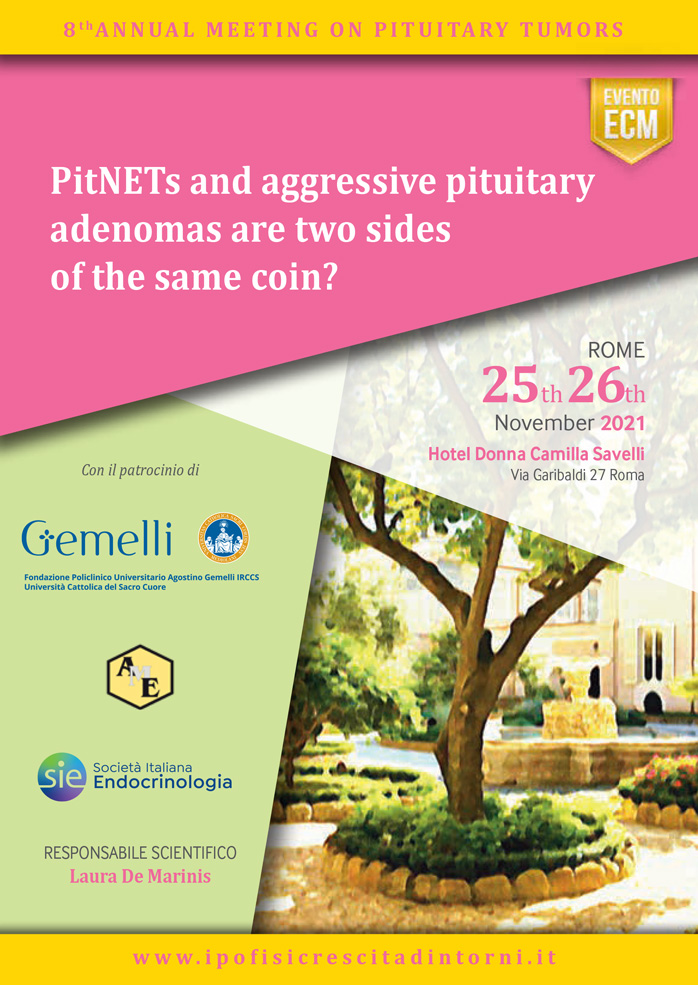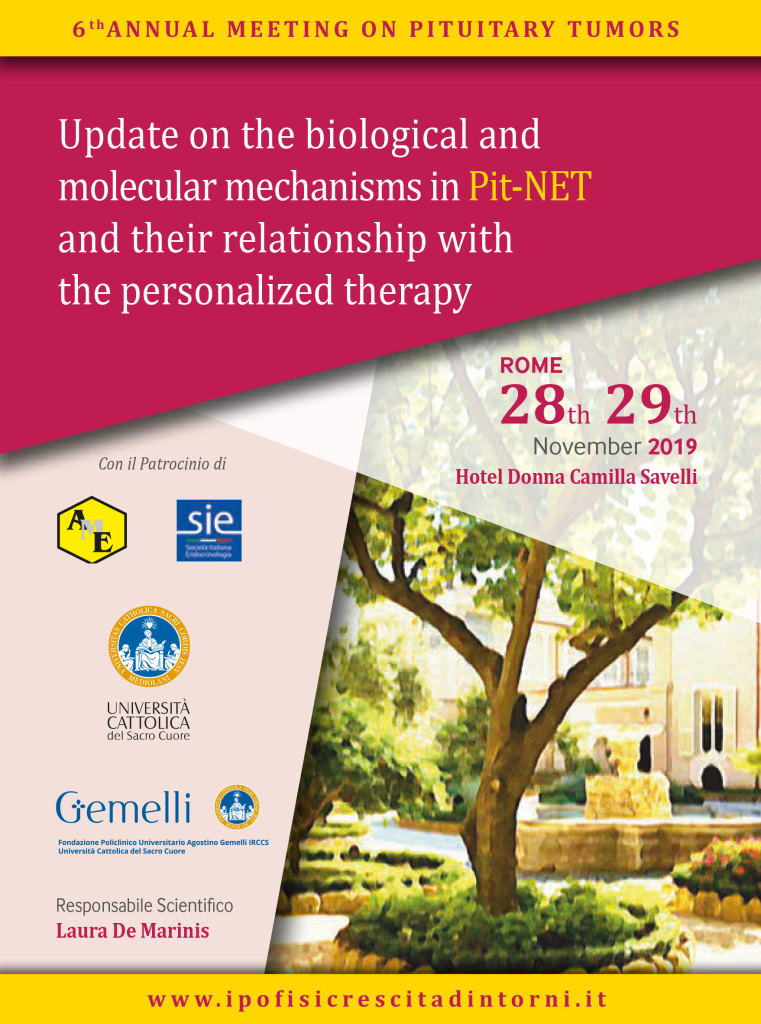8 th Annual Meeting on Pituitary Tumors

» Scarica il Programma
ROMA, 25 th – 26 th November 2021
presso Hotel Donna Camilla Savelli
DIRETTORE
Prof. Alfredo Pontecorvi
Professor of Endocrinology
Fondazione Policlinico Universitario A. Gemelli
Università Cattolica del Sacro Cuore, Rome
RESPONSABILE SCIENTIFICO
Prof.ssa Laura De Marinis
Coordinatore Scientifico del Master Universitario di II Livello in diagnosi e terapia delle patologie
ipotalamo ipofisarie – Policlinico Universitario A. Gemelli, Roma
SEDE DELL’EVENTO
Hotel Donna Camilla Savelli
Via Garibaldi, 27 – Roma – Tel. 06 588861
ECM 680 – 333893
Assegnati n. 10 crediti formativi ECM
L’evento rientra nel Piano Formativo ECM anno 2021 della DOTCOM Srl ed è rivolto alle figure professionali di:
• Medico – Chirurgo: Anatomia Patologica, Chirurgia Generale, Endocrinologia, Gastroenterologia, Genetica Medica, Malattie Metaboliche e Diabetologia, Medicina Interna, Medicina Nucleare, Neurochirurgia, Neuroradiologia, Oftalmologia, Otorinolaringoiatria, Patologia Clinica (Laboratorio di Analisi Chimico- Cliniche e Microbiologia), Radiodiagnostica, Radioterapia.
• Infermiere
ISCRIZIONE
Per iscriversi collegarsi al sito www.dotcomeventi.com
Per ragioni organizzative legate all’emergenza sanitaria in atto è obbligatoria la preiscrizione
La partecipazione all’evento è gratuita
ATTENZIONE! Sulla base della normativa vigente, per la partecipazione in presenza è necessario un GREEN PASS in corso di validità.
OBIETTIVO FORMATIVO
Documentazione clinica. Percorsi clinico-assistenziali diagnostici e riabilitativi, profili di assistenza – profili di cura
RATIONALE
Adeno-pituitary tumour represents a complex disease, with a wide spectrum of clinical ma-nifestations, according to the ability of secreting different hormones or pro-hormones and of invading the neighbouring anatomical structures, such as the same pituitary gland, the optical chiasm, the cavernous sinus, the bone, the third ventricle and the ventricular system.
In the most recent years, a better definition of these neoplasia was researched in order to identify biomarkers able to predict the natural history of adeno-pituitary tumour and their responsiveness to the different treatments.
Until now, the classifications of the neoplasms arising from adeno-hypophysial cells have been misleading because of their poor reproducibility and their weak ability in predicting the aggressiveness, the prognosis, and the outcome of these neoplasia. The 2004 WHO classifica-tion distinguished pituitary adenoma in typical and atypical ones according to the detection of mitoses and according to the expression of Ki-67 or p53. The 2004 WHO classification however failed in identifying pituitary tumours refractory to medical, surgical or radiation therapies or able to regrowth or to metastasize. Similarly, the new 2017 WHO classification lacks in defining the prognosis of pituitary neoplasia. Invasive, recurrent and proliferative pituitary neoplasia cause significant morbidity, in particular in cases of persistence hormonal hyper-secretion. Both long term hormonal hyper-secretion and hypopituitarism, in absen-ce of an adequate hormonal replacement therapy, are associated to increased morbidity and mortality for their systemic complications.
Therefore, recently, adeno-pituitary tumours were included in neuroendocrine tumours (NETs). This new terminology of pituitary neuroendocrine tumor (PitNET) may reflect better the potential for aggressiveness and malignant behaviour and of these neoplasia. Anyway a consensus on PitNETs was not jet reached.
On this basis, in the recent years, a wide number of research investigated the genetic, mo-lecular and biological features of PitNETs, in order to predict the clinical behaviour of these neoplasia and to personalize the treatments in not-secreting and secreting tumors as prolac-tinoma, acromegaly, Cushing disease. The current event has the aim of updating participants on the latest biological, genetic and clinical acquisitions on PitNET and on their impact in the management of PitNET affected patients according to the new knowledge, that requires a clo-se clinical collaboration between pathologists, neurosurgeries and endocrinologists.
The meeting is part of the teaching activities of the Master Degree in Diagnosis and Treatment of pituitary disease (2021) – Faculty of Medicine, Università Cattolica del Sacro Cuore, Rome.
LINGUE UFFICIALI
Italiano/Inglese
PROVIDER E SEGRETERIA ORGANIZZATIVA

Provider Standard accreditato presso la Commissione Nazionale ECM – ID 680
DOTCOM SRL
Via Flaminia, 54 | 00196 Roma
Tel. 06 4061370 | Fax 06 3242600
E-Mail: info@dotcomeventi.com
Sito web: www.dotcomeventi.com
Con la sponsorizzazione non condizionante di



